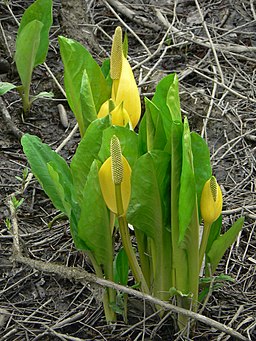 |
American skunk-cabbage, swamp lantern | Status LU: casual. 1st record: 2022 |
 |
Amerikanesch Heckepëppchen | Status Eur.: established. 1st record: UK 1901.1 IAS of EU concern (2016). |
 |
Lysichiton américain | RA: ISEIA: B1, Watch List. Harmonia+: 0,14 |
 |
Amerikanischer Stinktierkohl | Wikipedia: |
 |
Moeraslantaarn | Back to the list of neophytes |
Contents
Report the species
→ Report Lysichiton americanus to the National Museum of Natural History.
Brief description

IAS of Union concern
In 2016, Lysichiton americanus Hultén & H. St. John was added to the list of invasive alien species of Union concern (Anonymous 2016) which implies that member states shall take all necessary steps to prevent it’s unintentional introduction or spread.
Status and distribution in Luxembourg
Records of somethingelse in Luxembourg. Data source: Recorder-Lux, iNaturalist & GBIF, 2026-02-18.
Lysichiton americanus Hultén & H. St. John was first documented by Christiane Wolff via iNaturalist on 2022-05-31 and was confirmed by Maximilien Oly on 2022-06-02 in the Mamer valley close to Kopstal. Three individuals have been differenciated next to a tributary of the Mamer. The small population was eradicated by the local forestry service. The origin of the population has not been identified.

L. americanus in the Mamer valley on 2022-06-02 – plant in the background (EFOR-ERSA, M. Oly)

L. americanus next to a tributary of the Mamer (EFOR-ERSA, M. Oly)
Risk assessment
ISEIA protocol
B1 (2+3+3+2) = Watch List. First assessed 2019-01-24 by Manou Pfeiffenschneider and Christian Ries.
Harmonia+ protocol
Overall risk score 0,14 = (Overall Invasion score 0,34 x Overall Impact score 0,40) (Ries et al. 2020).
 Invasion
Invasion0,40

 Impact
Impact0,14

 Risk
RiskWorldwide distribution
Bibliography
- Anonymous, 2016. Commission implementing regulation (EU) 2016/1141 of 13 July 2016 adopting a list of invasive alien species of Union concern pursuant to Regulation (EU) No 1143/2014 of the European Parliament and of the Council. Official Journal of the European Union L 189: 4-5.
- Branquart, E., I. Stiers, S. Vanderhoeven, W. Van Landuyt, F. Van Rossum & F. Verloove, 2010. Harmonia database: Lysichiton americanus Hultén & H. St. John. Harmonia version 1.2, Belgian Forum on Invasive Species. URL: http://ias.biodiversity.be [accessed on 2019-11-21]
- CABI, 2021. Lysichiton americanus. In: Invasive Species Compendium. Wallingford, UK: CAB International. URL: www.cabi.org/isc [accessed 2021-03-04]
- MNHNL, iNaturalist & GBIF, 2020. Lysichiton americanus in MNHNL-mdata, online portal combining species observation from Recorder-Lux, iNaturalist and GBIF. National Museum of Natural History, Luxembourg. URL: https://mdata.mnhn.lu [Accessed 2020-03-02]
- Oly, M., 2022. Kartierung invasiver gebietsfremder Wasserpflanzen im Großherzotum Luxemburg, Untersuchungen zur Verbreitung von invasiven gebietsfremden Wasserpflanzen in einer beispielhaften Auswahl an Stillgewässern, Musée national d’histoire naturelle, Luxembourg. 117 pp.
- Ries, C., Y. Krippel & M. Pfeiffenschneider, 2020. Risk assessment after the Harmonia+ protocol of invasive alien vascular plant species in Luxembourg. Bull. Soc. Nat. luxemb. 122: 197-205. [PDF 132 KB]
Suggested citation of this webpage
Ries, C., M. Pfeiffenschneider & Y. Krippel (Eds.), 2026. Lysichiton americanus Hultén & H. St. John. In: neobiota.lu - Invasive Alien Species in Luxembourg. National Museum of Natural History, Luxembourg. URL: https://neobiota.lu/lysichiton-americanus/ [Accessed 2026-02-18].
Page content last updated on 2023-08-17. Last proofread by Caroline Grounds on 2019-11-19.
- Cf. CABI 2021.[↩]


